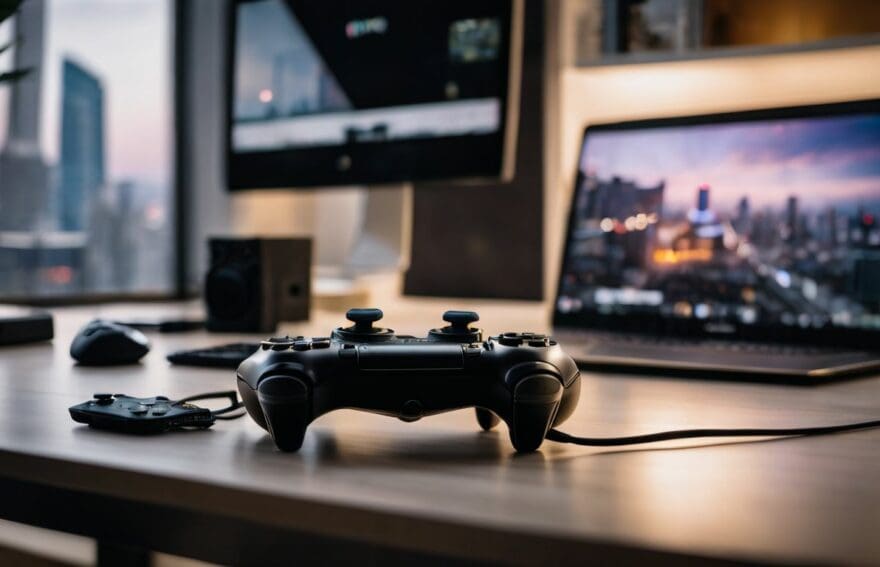Training for Triumph: Tips from FGC Pros

Updated On: November 29, 2025 by 
Are you finding it tough to climb the ranks in your favourite fighting games? You’re certainly not alone. Many of us have hit that same challenging plateau and yearned for the inside scoop on how to push past it.
We’ve peeked behind the curtain, taking leaf out of the pros’ book – those gaming maestros who grace stages at monumental tournaments like Evolution Championship Series, with its staggering 7,000+ contenders slugging it out in SF6.
Buckle up, because your journey towards FGC greatness is about to take a giant leap forward!
Developing the Training Mindset in Fighting Games
Understanding the importance of a training mindset and how it can impact your performance in fighting games is crucial. Cultivating a training mindset involves discipline, focus, and a willingness to learn and improve.
It can lead to benefits such as increased skill development, better game analysis, and improved combat techniques.
Understanding the importance of a training mindset
We recognise that embracing a training mindset is crucial for triumph in the competitive arena of fighting games. It’s not enough to simply play; we must engage with purpose and dedication, focusing on skill development at every session.
Our journey toward mastery involves breaking down complex combat techniques into manageable pieces, consistently drilling them until they become second nature. This approach transforms how we perceive challenges – no longer as obstacles but as stepping stones to greater achievement.
Developing this mindset paves the way for successful game analysis and tournament preparation, elements integral to any serious player’s routine. Through practice, we refine our strategies and sharpen our reflexes, making room for improvement in even the smallest aspects of gameplay.
Training with intention equips us with resilience—allowing us to persevere through losses and learn from them rather than being discouraged—to ultimately enhance our performance in high-pressure situations like those found in tournaments such as Evolution.
How to cultivate a training mindset
- To cultivate a training mindset, it’s crucial to set clear and achievable goals that align with your long-term aspirations in fighting games.
- Establish a consistent training routine that incorporates dedicated practice sessions focused on specific skills and techniques.
- Analyse your gameplay critically by reviewing match footage, identifying areas for improvement, and seeking feedback from experienced players.
- Embrace challenges as opportunities for growth, learning from setbacks, and failures to continuously refine your approach.
- Surround yourself with a supportive community of players who share your passion and can provide encouragement, motivation, and constructive criticism.
Benefits of having a training mindset in fighting games
Developing a training mindset in fighting games reaps numerous benefits. By embracing a dedicated training approach, players can enhance their muscle memory, allowing for smoother execution of complex combos during intense battles and tournaments.
Furthermore, a focused training mindset nurtures a competitive edge, enabling gamers to adapt swiftly to various play styles and strategies encountered in the dynamic world of fighting games.
Additionally, cultivating a training-oriented mentality fosters resilience and perseverance. This approach enables players to stay motivated even when facing setbacks or challenges.
Different Types of Controls for Fighting Games
Choosing the right controls for your fighting game experience can make a big difference in your learning and performance. Understanding the differences between classic and modern controls, and how they can impact your gameplay, is crucial for improving in fighting games.
Classic controls vs modern controls
As we delve into the world of fighting games, we recognise the pivotal role that controls play in our quest for mastery. They are the bridge between us and our in-game characters, translating our strategies into on-screen action. Here, we compare classic controls to modern controls, dissecting how each can shape our learning curve and performance.
| Aspect | Classic Controls | Modern Controls |
|---|---|---|
| Design Philosophy | Rooted in arcade traditions, requiring precise inputs. | Adapted for home consoles, often more ergonomic and user-friendly. |
| Learning Curve | Steep; demands dedication to master complex inputs. | More accessible, with streamlined inputs for newcomers. |
| Execution | Relies heavily on muscle memory and precise timing. | Features assistive options like combo shortcuts and buffers. |
| Customisation | Limited; players adapt to the given layout. | Flexible; controls can be tailored to individual preferences. |
| Community Perception | Often associated with the ‘purist’ approach to fighting games. | Seen as a way to introduce and retain new players in the FGC. |
Selecting the right controls is a personal journey, influenced by individual style and comfort. Some of us might find solace in the nostalgia of classic controls as shared by FGC veterans like Justin Wong, while others might lean towards the innovative features of modern setups.
Moving forward, let’s now focus on perfecting our craft through specific tips for improving in fighting games.
How controls can affect your learning experience
Different types of controls for fighting games can significantly impact your learning experience. Whether you opt for classic controls or modern ones, the choice can influence your ability to execute combos and perform advanced techniques.
The right controls catered to your play style are crucial for honing your skills and mastering the mechanics of fighting games. By selecting controls that resonate with you, you can enhance your performance and elevate your gameplay experience.
Choosing the suitable controls is imperative as it directly affects how well you understand and interact with a game’s mechanics. It is essential to consider factors such as visual appeal, button layout comfort, combo execution ease, and overall responsiveness when making this decision.
Choosing the right controls for you
- Accessibility: Ensure that the controls are comfortable and easy for you to use, allowing seamless execution of moves during intense gameplay.
- Customisation options: Look for controls that offer customisation features, such as button mapping, to tailor them to your specific playing style and preferences.
- Compatibility: Check if the controls are compatible with different platforms or consoles, providing flexibility and convenience for your gaming setup.
- Ergonomics: Consider the ergonomic design of the controls, as this can prevent hand fatigue and discomfort during extended gaming sessions.
- Responsiveness: Opt for controls with responsive buttons and accurate input recognition, enhancing your ability to execute precise moves and combos effectively.
- Durability: Choose controls that are durable and built to withstand rigorous use, ensuring longevity and reliability throughout your training and competitive play.
Tips for Improving in Fighting Games
We’ll discuss the importance of self-direction, discipline and routine in improving your skills in fighting games. Read on to find out how these tips can help you level up your game!
Self-direction: Learning how to learn
Learning how to learn is a key aspect of improving in fighting games. Understanding your own learning style and preferences can help you tailor your training to be more effective. By setting specific goals, seeking out resources, and taking ownership of your learning process, you can make significant strides towards mastering the mechanics and strategies of fighting games.
Experimenting with different training methods and seeking feedback from experienced players can provide valuable insights into areas for improvement. Embracing a growth mindset and staying open to new techniques will contribute to continuous progress in honing your skills as a fighter.
Discipline: Improving mental stamina
Developing mental stamina is a key aspect of excelling in fighting games. By committing to consistent practice and maintaining focus, players can build the discipline needed to push through tough matches and improve their performance.
Setting goals, adhering to a strict training routine, and embracing challenges can cultivate mental toughness crucial for success in competitive gaming.
Ensuring we stay disciplined not only enhances our skills but also sets us up for long-term success in the FGC. It allows us to tackle new strategies with confidence and determination while honing our abilities on the road to triumph.
Routine: Working towards your goals
After establishing discipline and improving mental stamina, now let’s focus on the importance of routine in working towards your goals in fighting games. Here are some valuable tips to help you structure an effective training routine:
- Set specific training goals: Define what you want to achieve in each practice session, whether it’s mastering a new combo or improving your defense tactics.
- Create a schedule: Allocate dedicated time for training that fits into your daily routine, ensuring consistency and progress.
- Warm-up exercises: Start every session with warm-up drills to prepare your mind and body for focused practice.
- Practice different scenarios: Work on various game scenarios and challenges to enhance adaptability and decision-making skills.
- Review and reflect: After each session, take some time to review your performance, identify areas for improvement, and plan for the next training session.
- Stay motivated: Keep yourself motivated by setting rewards for achieving milestones and celebrating small victories along the way.
Balancing Fighting Game Training and Life
Finding a balance between training and other responsibilities can be challenging, but with the right approach, it is possible to incorporate training into your daily routines without neglecting other aspects of life.
Prioritising health and self-care is essential for maintaining a healthy balance while pursuing success in fighting games.
Finding a balance between training and other responsibilities
Balancing training for fighting games with other responsibilities can be challenging, but it’s essential for overall well-being. It involves prioritising time effectively to ensure that both training and personal obligations are met.
Incorporating training into daily routines, such as setting aside specific times or integrating short practice sessions during breaks, can help strike a balance. Health and self-care should not be overlooked in the pursuit of gaming excellence, making it crucial to dedicate time for physical activity and relaxation amidst rigorous training schedules.
Maintaining equilibrium between your passion for fighting games and other life commitments requires careful planning and consideration of individual needs. By recognising the importance of structure and self-care, finding this equilibrium becomes achievable while pursuing success in the competitive gaming arena.
Incorporating training into daily routines
Balancing our training with other responsibilities is a vital aspect of becoming proficient in fighting games. To incorporate training into daily routines, carve out specific time slots for practice, whether it’s early morning or late at night.
It’s crucial to consistently dedicate time each day to hone your skills, ensuring progress and skill retention. By intertwining training with our regular schedules, we can elevate our gameplay without sacrificing other commitments.
Prioritising health and self-care
Incorporating training into daily routines is essential for improvement, but it’s equally important to prioritise health and self-care as part of your overall growth as a passionate gamer. Here are key points to consider:
- Regular Exercise: Engage in physical activities to maintain a healthy body and mind, which can positively impact your gaming performance.
- Balanced Diet: Fuel your body with nutritious meals and stay hydrated to sustain energy levels during long gaming sessions.
- Mental Well-being: Practise mindfulness and relaxation techniques to manage stress and maintain focus while playing.
- Adequate Rest: Get enough sleep to support cognitive function and allow your body time to recover from intense gameplay.
- Ergonomic Setup: Ensure your gaming environment is comfortable and promotes good posture to prevent physical strain during extended play.
The Future of the Fighting Game Community
Reflecting on the growth and changes within the community, we’ll explore how the fighting game scene has evolved over time and discuss our predictions for the future of fighting games.
Reflecting on the growth and changes within the community
The community has seen significant growth, with thousands of players participating in major tournaments. Evolution tournament, for example, boasted a 7,000+ player bracket for SF6, demonstrating the flourishing FGC.
Alongside this expansion is the evolving variety of characters and playstyles available to suit different gaming preferences. This diversity reflects the ever-changing landscape of fighting games and opens up avenues for more players to find their niche within the community.
The FGC continues to grow and adapt with each passing year.
Predictions for the future of fighting games
The future of fighting games looks promising as the genre continues to gain popularity and evolve. Esports is expected to play a significant role, with more tournaments offering substantial prize pools and attracting a wider audience.
As technology advances, we anticipate seeing innovative features and breakthroughs in game design, providing players with even more immersive experiences. The ongoing growth of the Fighting Game Community will likely lead to an increase in diverse representation and inclusivity within the gaming industry.
Furthermore, we expect to see continued collaborations between developers and professional players, leading to enhanced gameplay mechanics and balanced character rosters. With advancements in streaming platforms and online connectivity, competitive play is anticipated to become more accessible, allowing players from all regions to participate in global events seamlessly.
Conclusion
In conclusion, the insights and advice shared by FGC professionals provide valuable strategies for improving in fighting games. Embracing a training mindset, choosing the right controls, and balancing training with life responsibilities are crucial elements for success.
By integrating these tips into their routines, gamers can elevate their skills and performance, ultimately triumphing in the competitive world of fighting games.
FAQs
1. What’s the best way to train for success in fighting games?
Developing a training routine that involves mastering combos, learning game fundamentals, and practising different fighting strategies is key.
2. How can I improve my techniques in fighting games?
Honing your skills by consistent combo practice, understanding game mechanics and applying advice from professional gaming experts can help enhance your performance.
3. Why is having a learning mindset important in FGC training?
Adopting a learning mindset allows you to continuously seek new strategies for improving and keeps you open to valuable tips from FGC pros.
4. Can professional gamers offer useful strategy advice for newcomers?
Absolutely! Professional players’ insights on competitive mindset and strategy advice are invaluable for anyone looking to succeed in the world of competitive gaming.
5. Are there specific training techniques recommended by FGC pros?
Yes, FGC professionals recommend techniques such as focusing on learning the fundamentals of fighting games while progressively enhancing more complex skills like timing and spacing.


